In a world that’s more connected than ever, the rise of online peer coaching jobs has opened doors for people who want to make a real difference—without ever leaving the couch.
Whether you’re guiding someone through addiction recovery, helping them navigate mental health challenges, or simply lending an empathetic ear, online peer coaching jobs offer flexible, meaningful work with a mission.
If you’re someone who’s walked the walk and is ready to talk the talk, this may just be your calling.
What makes these roles so compelling? Besides the flexibility and remote access, there’s something deeply rewarding about peer support.
You’re not a therapist in a lab coat or a clinician scribbling notes—you’re someone who gets it. And that’s powerful.
Positions like remote peer support specialist jobs and peer support moderator jobs are growing rapidly, creating unique opportunities for certified professionals and those with lived experience alike.
These jobs aren’t just gigs—they’re part of a growing mental health revolution.
You’ll also find specific niches to explore, such as peer support specialist jobs, recovery support specialist jobs, and certified peer recovery specialist jobs.
Whether you’ve just received your certification or you’re a seasoned recovery veteran, there’s a spot for you in this ever-evolving digital space.
In this article, I’ll break down where to look, what to expect, and how to stand out in the crowd of hopefuls ready to help others rise.
Let me get you plugged into purpose.
Related:
8 Companies That Offer Online Teaching Jobs for Certified English Teachers
30 Tips to Help You Land High-Paying Content Writing Jobs
Who is a Peer Coach?
A Peer Coach is someone who has gone through similar life experiences and uses that personal journey to support, guide, and encourage others who are facing the same kinds of challenges.
Instead of offering clinical advice, a peer coach listens, shares what helped them, and walks alongside others as a mentor, motivator, and trusted companion on the path to healing or personal growth.
What is the Job of a Peer Coach?

A Peer Coach wears many hats, often acting as a mentor, guide, motivator, and accountability partner.
The job is rooted in empathy, lived experience, and a shared understanding of the journey through recovery, personal development, or mental health management.
Here’s a detailed breakdown of what the job of a peer coach looks like:
Building Trust Through Shared Experience
One of the foundational roles of a peer coach is to build trust. Unlike traditional counselors or therapists, peer coaches connect on the basis of mutual experience.
They openly share parts of their journey when appropriate, helping others feel understood and less alone. This sense of trust creates a safe space for clients to open up and begin the process of change.
Offering Emotional Support and Encouragement
Peer coaches offer consistent emotional support to individuals who may be struggling with challenges like addiction, trauma, or mental health issues. They help clients build confidence, recognize their strengths, and celebrate even the smallest victories.
Encouragement is key in this role, and peer coaches know how to uplift without overwhelming.
Guiding Clients in Setting and Achieving Goals

A critical component of peer coaching is goal setting.
Peer coaches work with clients to set realistic, personalized goals—whether it’s maintaining sobriety, developing coping skills, or re-entering the workforce.
They assist in breaking down larger goals into manageable steps and provide ongoing motivation and feedback throughout the process.
Providing Practical Tools and Resources
Peer coaches often serve as bridges to helpful resources. They provide clients with practical tools like coping strategies, time management techniques, and access to support groups or mental health services.
Having already navigated these systems themselves, peer coaches are uniquely positioned to offer insider insights that clients can trust.
Creating and Maintaining Accountability
Accountability is another vital part of the job.
Peer coaches help clients stay committed to their goals by checking in regularly, reviewing progress, and helping clients stay focused.
These check-ins are not judgmental but instead serve as supportive reminders of the client’s commitment to growth.
Facilitating Group Peer Support Sessions
In many roles, peer coaches also lead or co-facilitate group sessions.
These gatherings provide a supportive environment where individuals can share experiences, challenges, and victories.
Peer coaches help maintain structure during these meetings and encourage participation from all members.
Navigating Mental Health and Recovery Systems
Because they’ve often experienced these systems themselves, peer coaches help clients navigate the often-confusing world of mental health and recovery services.
They explain how to access treatment, apply for housing or employment programs, and understand their rights within healthcare systems.
Modeling Healthy Behavior and Boundaries
A peer coach doesn’t just talk the talk—they model the behaviors they encourage.
This includes setting boundaries, practicing self-care, maintaining healthy relationships, and managing stress.
Clients often learn more from what their peer coach does than from what they say.
Supporting Crisis Prevention (But Not Crisis Intervention)
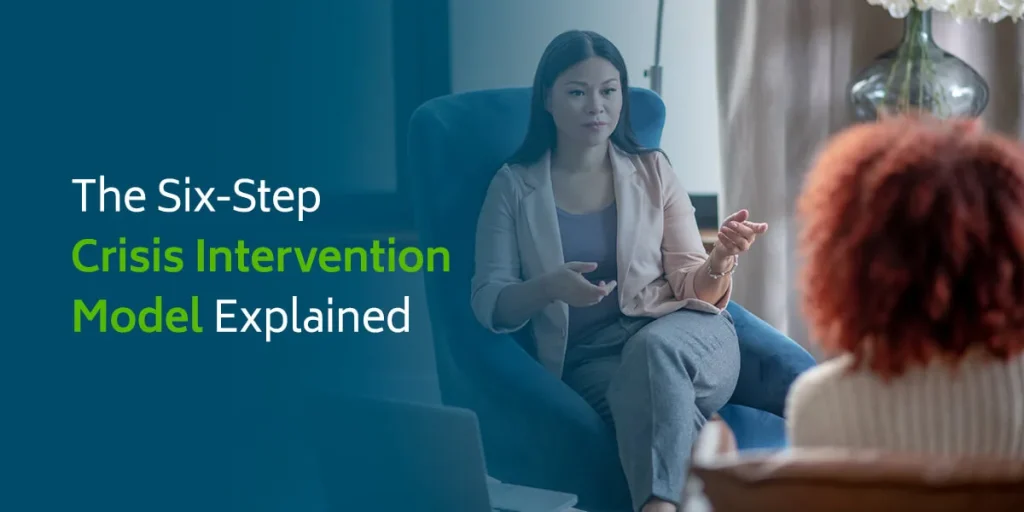
While peer coaches are not licensed clinicians or crisis counselors, they do play a role in preventing crises.
By maintaining regular contact and helping clients recognize early warning signs of relapse or emotional distress, peer coaches contribute to early intervention.
They are trained to know when and how to refer someone to professional help when needed.
Promoting Empowerment and Independence
Peer coaches empower clients to take ownership of their recovery or personal growth.
Rather than offering solutions, they ask guiding questions that help individuals find their own answers.
The goal is to reduce dependency on the coach and foster long-term self-reliance.
Respecting Confidentiality and Ethics
Like any helping professional, peer coaches must respect confidentiality. They follow ethical guidelines to protect the privacy and dignity of those they support.
This includes understanding when information can be shared and maintaining professional boundaries.
Advocating for Client Needs
Peer coaches often act as advocates, helping clients speak up for their needs in medical, legal, or social services settings.
They may attend meetings or appointments with clients, help them prepare to self-advocate, or connect them with advocacy organizations.
Offering a Non-Judgmental Space
Above all, peer coaches offer a non-judgmental, stigma-free space. Clients often come from environments where they’ve been misunderstood, blamed, or marginalized.
A peer coach creates an environment where the client’s voice is heard and their experiences validated.
Staying Informed and Continuing Education
While lived experience is the foundation of peer coaching, ongoing education is important too.
Through workshops, webinars, and certifications, peer coaches stay current on the latest recovery tools, mental health strategies, and community resources.
This helps them remain effective and relevant in their support.
Using Technology to Connect
Since many peer coaching jobs are remote, using technology effectively is part of the role.
Peer coaches may conduct sessions via video calls, messaging platforms, or specialized coaching apps.
They also track progress and keep records digitally while ensuring data privacy.
Collaborating with Other Professionals
Peer coaches often work as part of a larger team, including therapists, case managers, and healthcare providers.
Collaboration is key to ensuring that the client receives comprehensive care.
Peer coaches share relevant observations (with consent) and contribute to treatment planning.
Adapting to Each Client’s Unique Needs
No two clients are the same. A great peer coach adapts their approach based on the client’s personality, background, goals, and comfort level.
This flexibility helps create a customized, person-centered support system that feels empowering rather than prescriptive.
Maintaining Self-Care and Preventing Burnout
Finally, because the work can be emotionally taxing, peer coaches are encouraged to maintain strong self-care routines.
This includes having their own support systems, setting work-life boundaries, and taking time to recharge.
Healthy peer coaches are far more effective and sustainable in their roles.
The job of a peer coach is as rewarding as it is dynamic.
It involves building meaningful connections, guiding others through change, and empowering people to reclaim their lives.
Whether working in addiction recovery, mental health, or life coaching, peer coaches are vital allies on the road to healing and self-discovery.
How to Become a Peer Coach
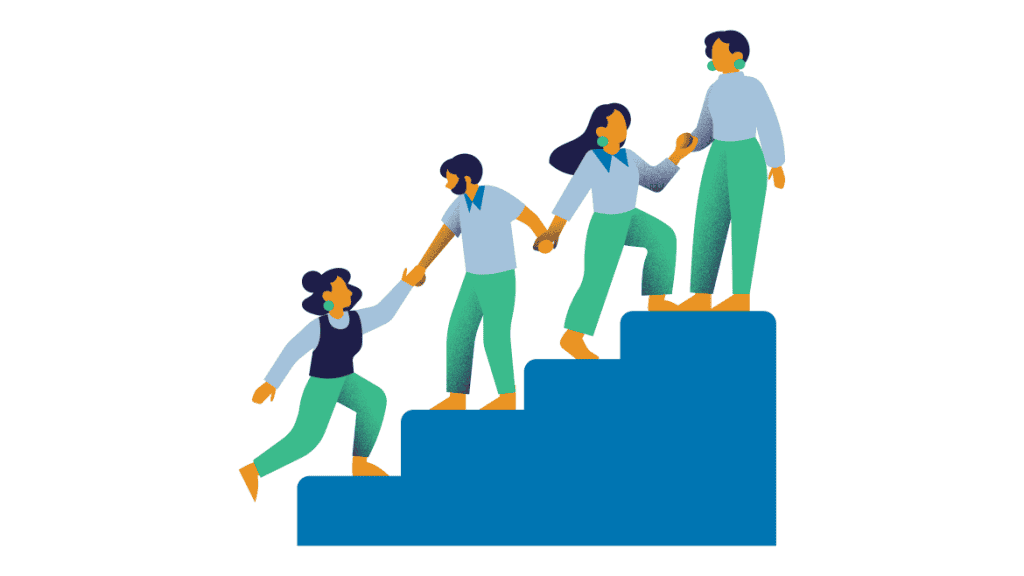
Becoming a peer coach isn’t just about having the right credentials—it’s about lived experience, empathy, and a passion for helping others navigate their own paths to wellness and growth.
Whether you’re interested in online peer coaching jobs, looking into remote peer support specialist jobs, or aiming to transition into certified peer recovery specialist jobs, the journey starts with understanding what it takes to step into this unique and powerful role.
Peer coaching is a rapidly growing field, especially in the virtual space.
The flexibility of working remotely while making a real difference in people’s lives is drawing more and more individuals to pursue this career.
But how do you get started? What qualifications or experiences are needed? And where can you learn the necessary skills?
In this section, I’ll walk you through everything you need to know to become a peer coach—from building the right foundation and earning relevant certifications to gaining hands-on experience and finding the right opportunities.
Whether you’re transitioning from your own recovery journey or shifting careers to make a greater impact, this guide is your launchpad into the world of peer support specialist jobs, recovery support specialist jobs, and beyond.
Here is a step-by-step break down on how to become a peer coach:
Step 1: Identify Your Lived Experience and Strengths
The first step to becoming a peer coach is to reflect on your personal journey.
What challenges have you overcome? Whether it’s mental health recovery, addiction, trauma, or life transitions, your lived experience is your greatest qualification.
Identify your strengths—compassion, communication, resilience—and consider how they can support others on similar paths.
Step 2: Research Requirements in Your Area
Depending on your location and the type of coaching you want to do, requirements can vary.
Some organizations require certification, especially for certified peer recovery specialist jobs, while others may prioritize lived experience and interpersonal skills.
If you’re planning to pursue remote peer support specialist jobs or roles with healthcare providers, make sure to check for any state-specific training or licensing.
Step 3: Enroll in a Peer Support Certification Program
While not always mandatory, completing a certified training program can increase your job prospects and credibility.
Look for programs approved by your state or recognized by national organizations like Mental Health America (MHA), the National Alliance on Mental Illness (NAMI), or SAMHSA.
These programs typically cover core skills like active listening, trauma-informed care, ethics, boundaries, and cultural competency.
Step 4: Gain Experience Through Volunteering or Internships
Hands-on experience can be incredibly valuable. Many aspiring peer coaches begin by volunteering with recovery centers, crisis hotlines, or peer-led support groups.
This exposure helps you refine your skills, expand your network, and gain insight into different coaching environments.
It’s also a great way to build confidence and determine your ideal niche.
Step 5: Specialize Based on Your Passion
There are many types of peer coaching roles. Some are focused on addiction recovery (recovery support specialist jobs), others on mental health, chronic illness, housing support, or reentry after incarceration.
Consider which population or focus area resonates most with your background and values. Specializing can make you more competitive in job searches.
Step 6: Build a Resume That Highlights Lived Experience and Training
Your resume should spotlight your lived experience in a professional, strengths-based way.
Include any relevant certifications, volunteer roles, support group leadership, or community involvement.
Use action-oriented language to describe how you helped others, led initiatives, or collaborated with professionals.
Step 7: Explore Job Opportunities Online
Once you’re trained and ready, start exploring online peer coaching jobs.
Search on job boards like Indeed, LinkedIn, and ZipRecruiter using keywords such as peer support specialist jobs, peer support moderator jobs, and remote peer support specialist jobs.
Also, check the careers pages of non-profits, mental health agencies, recovery centers, and telehealth platforms.
Step 8: Prepare for Interviews and Background Checks
Peer coach roles often require background checks, especially if you’re working with vulnerable populations.
Be honest about your past, especially if it’s relevant to your coaching experience—many organizations value transparency and personal growth.
Prepare for interviews by practicing how you’ll talk about your recovery journey in a professional, hopeful, and supportive way.
Step 9: Join Professional Peer Networks
Joining professional organizations and online communities can keep you informed and inspired.
Networks like the International Association of Peer Supporters (iNAPS) or state-level peer support groups offer networking events, continuing education, and job postings.
Being part of a supportive professional community helps you stay connected and avoid burnout.
Step 10: Continue Growing and Learning
Becoming a peer coach isn’t a one-time achievement—it’s a lifelong journey.
Stay up to date with new practices, attend training sessions, and seek mentorship from seasoned peer coaches.
The more you grow, the more you’ll have to offer the people you support.
Becoming a peer coach takes dedication, empathy, and a willingness to keep learning.
But for those drawn to helping others transform their lives, it’s one of the most rewarding paths you can take.
15 Websites that Offer Online Peer Coaching Jobs
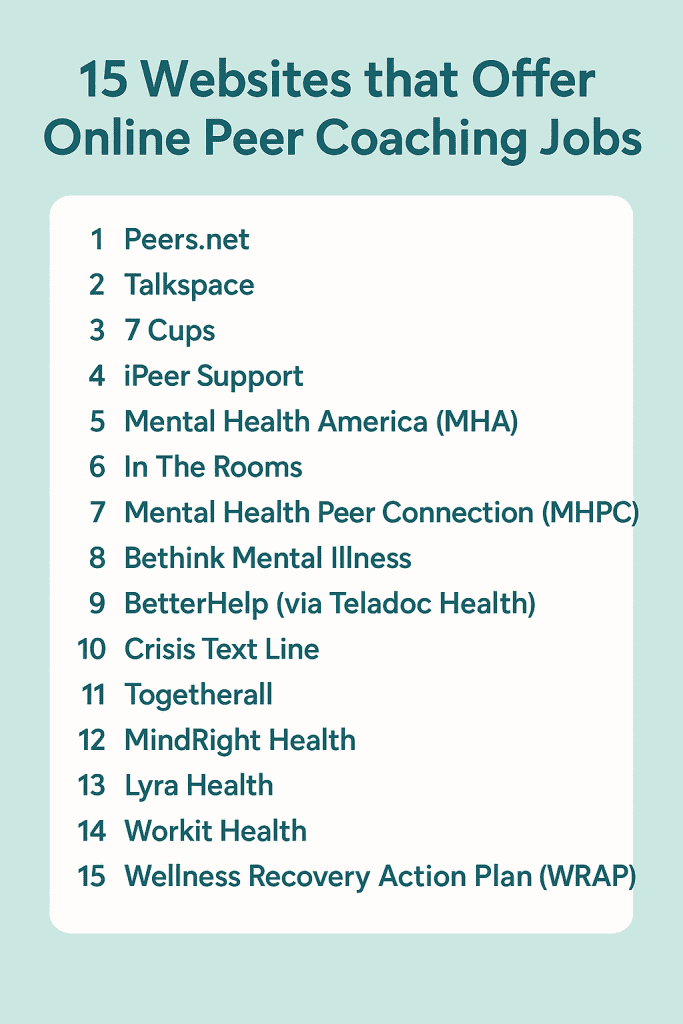
With the growing recognition of peer coaching as a valuable part of mental health, wellness, and recovery programs, more organizations are actively hiring for online peer coaching jobs.
Whether you’re newly certified or have years of experience as a peer support specialist, there are platforms that match your skills with remote clients in need of support.
Below are 15 trusted websites where you can find remote peer support specialist jobs, recovery support specialist jobs, and even peer support moderator jobs from the comfort of your home.
1. Peers.net
Peers.net is a specialized platform dedicated to hiring certified peer recovery coaches.
The company connects individuals in recovery with trained peers who can support their wellness journey.
You’ll find both part-time and full-time certified peer recovery specialist jobs, all remote.
- What they offer: One-on-one coaching, support group facilitation.
- How to apply: Visit Peers.net and go to their careers section. You’ll need to submit proof of certification and relevant experience.
- Bonus: Ongoing professional development is provided.
2. Talkspace
Talkspace is a well-known platform for mental health services that also hires peer support coaches in addition to licensed therapists.
- What they offer: Text and video-based support services; coaching roles under supervision.
- How to apply: Check Talkspace Careers regularly for “Peer Support” roles.
- Pro Tip: Having a background in mental health or recovery adds weight to your application.
3. 7 Cups
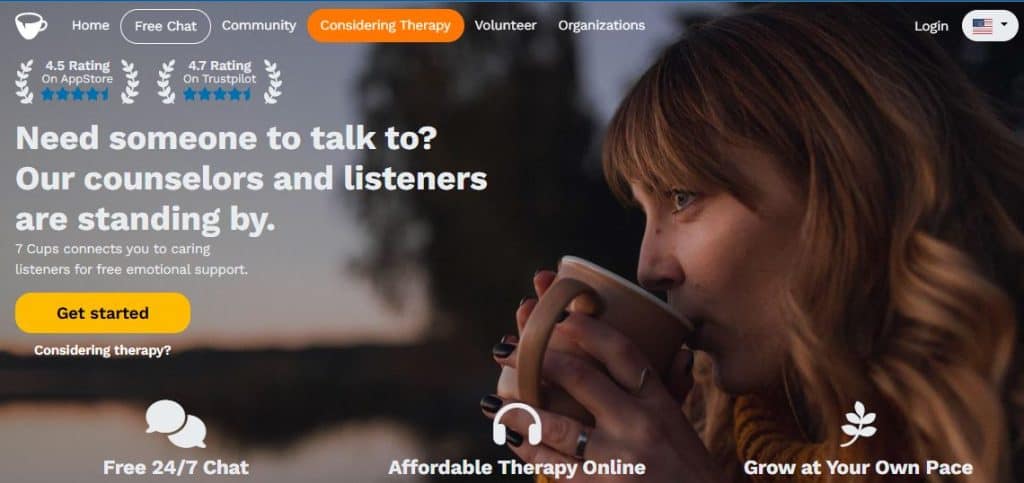
A leading platform in emotional support, 7 Cups offers an excellent entry point for aspiring peer coaches.
- What they offer: Volunteer and paid peer listener roles, emotional support chats.
- How to apply: Sign up at 7cups.com, complete their free Active Listening training, and apply for jobs under the “Careers” tab.
- Great For: Gaining initial experience before moving into paid peer support specialist jobs.
4. iPeer Support
iPeer Support is a platform that focuses solely on virtual peer support services, often hiring for roles in recovery and mental health.
- What they offer: Peer coaching, support groups, and community moderation.
- How to apply: Visit ipeersupport.com and fill out the “Work With Us” form. You’ll need certification and lived experience.
- Best Feature: Strong community and great peer-to-peer support training.
5. Mental Health America (MHA)
MHA frequently posts peer support specialist jobs in their job board listings, including remote opportunities with partner organizations.
- What they offer: Certified and volunteer peer coaching, training opportunities.
- How to apply: Go to mhanational.org and click on “Careers” or check their job board.
- Tip: MHA sometimes partners with states or nonprofits—watch for local postings.
6. In The Rooms
This recovery-based social network offers virtual peer coaching and support jobs, especially for those with experience in addiction recovery.
- What they offer: Moderation of support meetings, peer recovery coaching, and group leadership.
- How to apply: Reach out via InTheRooms.com or monitor their careers section.
- Requirement: Many roles require certification as a certified peer recovery specialist.
7. Mental Health Peer Connection (MHPC)
This New York-based organization provides peer services across the state, including online positions.
- What they offer: Peer coaching for those with mental health diagnoses.
- How to apply: Check out wnyil.org under “Employment Opportunities.”
- Note: Preference is given to applicants with lived experience and Peer Specialist certification.
8. Rethink Mental Illness
This UK-based organization offers occasional remote peer support roles and community moderation jobs.
- What they offer: Peer coaching, mentoring, and education-based support.
- How to apply: Visit rethink.org and click on “Working With Us.”
- International Option: Great if you’re located outside the U.S. or open to global coaching.
9. BetterHelp (via Teledoc Health)
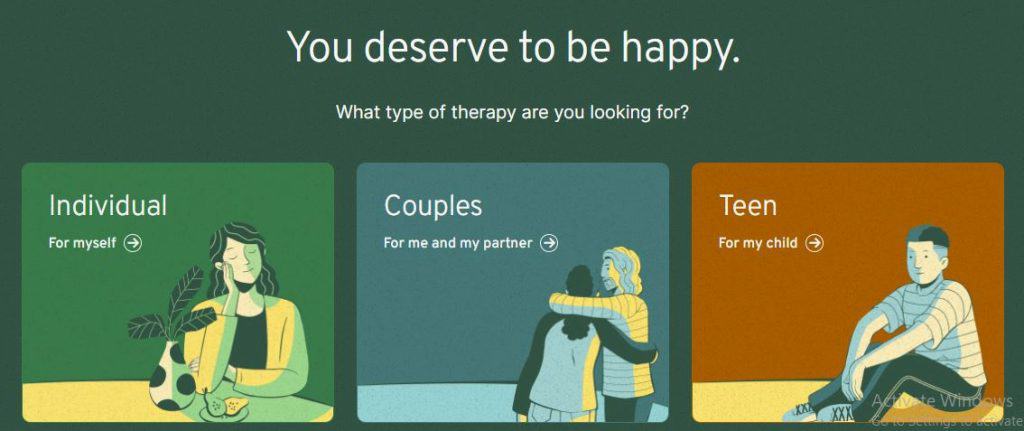
While BetterHelp mostly hires licensed therapists, they have partner platforms that use peer supporters and recovery coaches.
- What they offer: Peer-led mental wellness programs.
- How to apply: Go to betterhelp.com and follow the “Jobs” or “Partner Opportunities” link.
- Watch For: Openings on partner programs like Regroup or Teledoc that include peer support roles.
10. Crisis Text Line
Although primarily volunteer-based, Crisis Text Line gives you nationally recognized training and experience that can lead to paid peer support specialist jobs.
- What they offer: Crisis support via text, community moderation.
- How to apply: Sign up at crisistextline.org and complete their online training.
- Perk: Great training to put on your resume if you’re just starting out.
11. Togetherall
Togetherall is an online peer support community that hires trained moderators to maintain a safe and supportive space.
- What they offer: Peer moderation, mental wellness coaching, community oversight.
- How to apply: Check togetherall.com under “Careers” for remote roles.
- Ideal For: Those looking to transition into peer support moderator jobs.
12. MindRight Health
Focused on teens and underserved communities, MindRight offers paid roles for certified peer coaches.
- What they offer: Text-based peer coaching in mental health and trauma recovery.
- How to apply: Visit mindright.io and scroll to the bottom to view openings.
- Must Have: Cultural competency and lived experience in mental health challenges.
13. Lyra Health
Lyra Health works with corporations to offer comprehensive wellness programs, sometimes hiring peer support specialists for corporate wellness roles.
- What they offer: Coaching, peer mentoring, workplace wellness.
- How to apply: Go to lyrahealth.com and browse their “Careers” page.
- Heads Up: Some roles may require a mental health or coaching background.
14. Workit Health
A digital addiction recovery clinic that often hires recovery support specialist jobs for peer-led programming.
- What they offer: One-on-one recovery coaching, educational programming.
- How to apply: Visit workithealth.com and check their “Careers” page.
- Bonus: Includes full-time remote positions with benefits.
15. Wellness Recovery Action Plan (WRAP)
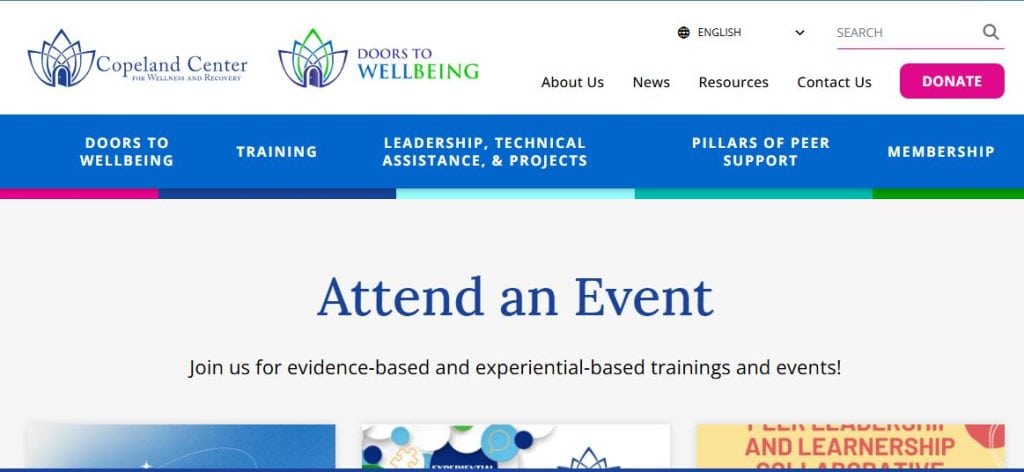
WRAP-certified peer supporters can often find work through organizations licensed to use WRAP programming.
- What they offer: Facilitator-led coaching based on the WRAP model.
- How to apply: While WRAP itself doesn’t hire, visit copelandcenter.com to find affiliated organizations and job leads.
- Best For: Certified coaches with WRAP training or those seeking WRAP certification.
The Objective of Peer Coaching
The objective of peer coaching is to empower individuals by offering support from someone who has lived through similar experiences, challenges, or situations.
The goal is to create a safe, empathetic space where the peer coach can guide, listen, and share insights that are relevant to the coachee’s personal journey.
In this dynamic, the coach isn’t just offering advice— they’re facilitating self-discovery and growth through mutual respect, understanding, and shared experiences.
In peer coaching, the focus is on:
- Emotional support: Providing encouragement, understanding, and validation.
- Skill development: Helping individuals build coping strategies, self-regulation, and decision-making.
- Goal setting: Supporting the coachee in defining and reaching personal or professional goals.
- Shared learning: Both the coach and coachee learn from each other’s experiences.
Essentially, peer coaching aims to create a partnership based on equality, where both individuals share their knowledge, challenges, and growth in a way that fosters empowerment and mutual respect.
What is the Difference Between Peer Coaching and Mentoring?
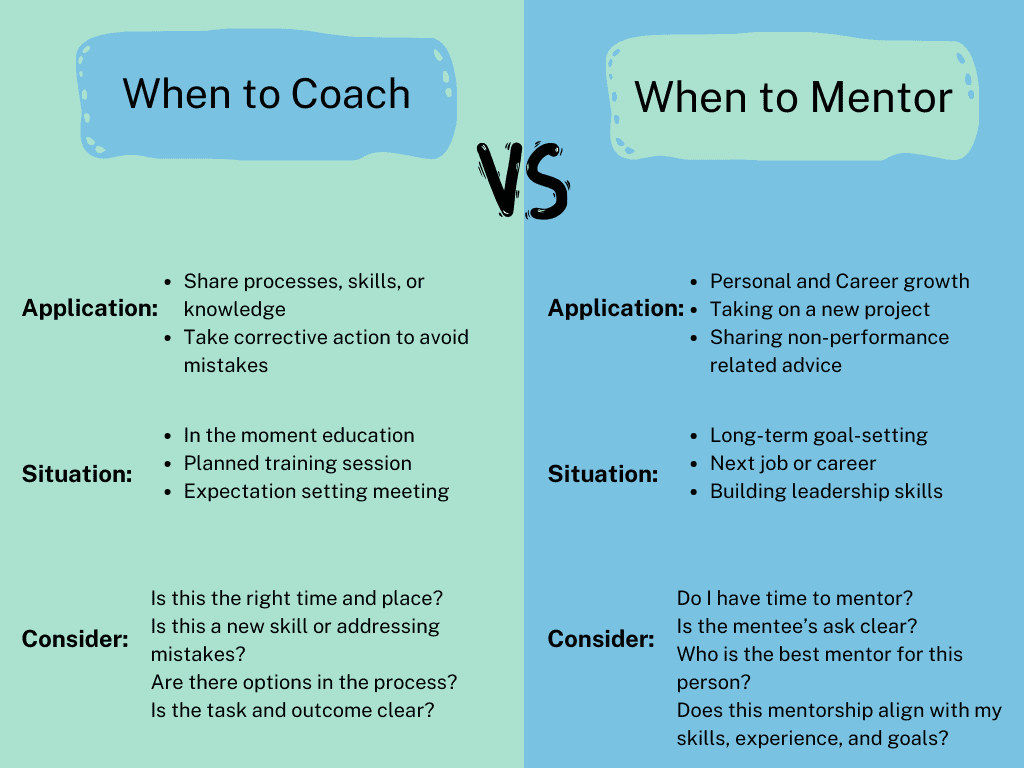
Understanding the difference between peer coaching and mentoring is crucial for anyone considering a role in either area.
While both focus on personal and professional development, they approach the relationship and process in different ways.
Here’s a clear comparison of the two concepts:
| Aspect | Peer Coaching | Mentoring |
| Relationship Type | Equal partnership between coach and coachee. | Hierarchical relationship with mentor as the guide. |
| Experience Level | Coaches and coachees typically have similar experiences. | Mentors have more experience or expertise in a specific field. |
| Focus | Personal growth, specific challenges, and mutual learning. | Professional growth, career advice, and personal development. |
| Duration | Shorter-term, often focused on specific goals. | Long-term, often a continuous relationship. |
| Role of the Coach | Facilitates self-discovery and goal setting. | Provides advice, guidance, and shares expertise. |
| Type of Guidance | Encourages reflection and self-direction. | Offers solutions, advice, and direction. |
| Scope of Topics | Often related to personal issues, life skills, or recovery. | Focuses on career development and professional advice. |
| Expected Outcomes | Self-improvement, skill-building, and emotional support. | Career advancement, knowledge sharing, and leadership development. |
From the above table, the key differences are:
- Relationship Dynamics: In peer coaching, both individuals are on a similar level, sharing experiences to help one another. In contrast, mentoring usually involves a more experienced individual guiding someone who is still learning or developing in their career.
- Goals and Focus: Peer coaching tends to focus on personal growth or specific challenges, such as recovery or skill-building. Mentoring is often geared toward career guidance, personal development, and knowledge transfer.
- Advice vs. Facilitation: Peer coaches help by facilitating the coachee’s growth through reflective conversations, while mentors tend to provide direct advice and guidance based on their experience.
By understanding these differences, you can determine which relationship is more suited to your needs, whether you’re seeking support or aiming to provide guidance.
What is the Most Popular Coaching Model?
There are several coaching models, but the GROW model is by far the most popular and widely used approach, particularly in peer coaching and other coaching environments.
The GROW Model is an acronym that stands for:
- G – Goal: Establish the coachee’s goals and aspirations. What do they want to achieve through coaching?
- R – Reality: Assess the current situation. What is going well, and what are the obstacles or challenges?
- O – Options: Explore different strategies or approaches that could help the coachee achieve their goals. What are the available resources and possibilities?
- W – Will: Determine the actions the coachee is committed to taking. What steps will they take to move forward, and how will they stay accountable?
This model is particularly effective because it is structured yet flexible, allowing for a dynamic coaching experience tailored to the coachee’s needs and goals.
It encourages clear communication, goal clarity, and actionable steps, which are key in any coaching relationship.
To Sum Up
In conclusion, peer coaching is a transformative process that empowers individuals through shared experience, emotional support, and mutual growth.
Whether you’re exploring online peer coaching jobs or considering a career as a peer support specialist, it’s clear that the need for these roles is growing rapidly.
The objective of peer coaching is to help individuals improve their lives by building skills, setting goals, and finding strength through shared knowledge.
Understanding the distinctions between peer coaching and mentoring, as well as the popular GROW model, will help you navigate the professional landscape of coaching.
If you are considering entering the field, remember that peer coaching is about helping others by sharing experiences and fostering an environment of empathy, trust, and growth.
You can find opportunities to make a real impact by leveraging platforms and companies offering peer support specialist jobs.
Whether you’re starting from scratch or already have certifications, there are abundant opportunities to step into the world of peer coaching and support.











